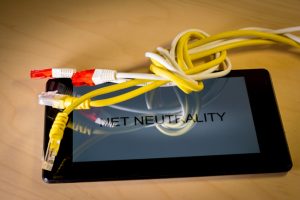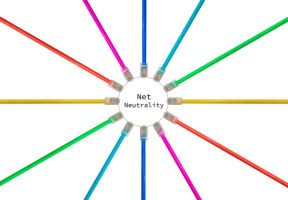In the grand political scene, there are many debates raging, with strong pros and cons passionately proclaimed by both sides. Within the tech realm, one of those hot-button issues is Net Neutrality. Though Net Neutrality isn’t specifically a U.S. issue (there are also ongoing battles in the United Kingdom, Canada, India, Russia, and other world powers), the most recent battle is played out in the Trump administration’s FCC, as they seek to undo much of what the Obama administration put into force in the previous two presidential administrations.

Net Neutrality: What Is It?
Net Neutrality is legislation written and enforced by the FCC, although the basis for it was widespread public outrage over how Internet providers handle certain content. The legislation is designed to regulate communications providers, primarily Internet providers like cable companies, phone companies, and cellular providers. Before Net Neutrality, internet providers were allowed to throttle content, meaning they could deny or delay access to content according to their own policies and procedures.
That might mean blocking access to competitors’ content, but it could also mean blocking content that the company deemed inappropriate, against their own personal belief system, etc. Most notably, the legislation deals with issues such as Comcast’s well-publicized throttling of peer-to-peer file sharing practices.
Net Neutrality: Why Do Proponents Feel It’s So Important?
The argument for Net Neutrality is that without it, Internet providers can block or slow access to content they don’t want people to see. This might mean blocking certain political or religious beliefs. It could also mean blocking access to competitors’ content.
Numerous special interest groups are staunch advocates of Net Neutrality, supporting any efforts to make all points of view equally accessible. For example, LGBT groups are afraid that without these regulations, people could silence their voice and limit their outreach efforts. Similarly, many mainstream Muslims fear that all Islamic voices might be silenced in an effort to squelch “hate speech” by radicalized groups, like ISIS or others associated with terror.
Large companies including the top VPN services, Amazon, Microsoft, Facebook, AT&T, and Netflix are vocal supporters of Net Neutrality. Small businesses also tend to favor the legislation, fearing that their online marketing efforts won’t receive the fairness it deserves without legislation preventing Internet providers from throttling or denying access to it.
Net Neutrality: Who Wouldn’t Want It?

But those opposed to “the big government” see things differently. The very fact that big business, as well as those proposing more intrusive government control, strongly support the legislation is enough to turn them off.
One of the strong arguments against Net Neutrality is the continuing intrusion on the lives and activities of private citizens by big business and the big government. In order to regulate throttling, the online activities of private citizens have to be monitored. You cannot enforce what you do not monitor.
While you may or may not like any current administration (or Internet provider), there is no guarantee that you will like all future leaders. They see the government as the ultimate monopoly, untrustworthy in regards to regulating businesses. Less regulation, they believe, leads to a free market in which everyone has the right to compete and to succeed, without interference or intrusion.
Those against Net Neutrality also argue that it doesn’t even do what it’s supposed to do. The legislation does not include language that compels Internet providers to treat all content the same, and even with Net Neutrality, Internet providers still offered “tiered” pricing structures that feature different speeds to customers, based on their ability and willingness to pay for speedy services.
Net Neutrality also stifles growth because it discourages Internet providers from making investments in their infrastructure and services. Others argue that you cannot regulate such a new and cutting-edge technology as the Internet based on guidelines established for utility companies, which are over a century old. Inevitably, competition drives innovation, investments, and improvements that tend to improve services, lower costs, and ensure a better future for any technology.
Net Neutrality: What’s The Bottom Line?

In essence, the arguments over Net Neutrality are less about the relatively limited issue of throttling content and much more over how much to regulate the industry and private citizens. Those who tend to support bigger government and more government control support Net Neutrality. People who believe in smaller government and less intrusion of the government in the private lives of people are staunchly opposed.
Opponents thrashed the original implementation of Net Neutrality back in 2015, warning the sky would certainly fall if it became a reality. That didn’t happen. Similarly, the sky won’t likely fall with the repeal of Net Neutrality, either, contrary to the very loud cries from its supporters. In fact, before Net Neutrality was enacted, there were only a few instances in which it became a real problem, such as the aforementioned Netflix incident.
The FCC put the final version of Net Neutrality into effect in June of 2015, during the Obama administration, with the help of then-FCC member Ajit Varadaraj Pai. Pai was elevated to FCC chairman by President Trump and oversaw the reversal of Net Neutrality in the U.S. in December 2017.
Though currently not in force, don’t expect this debate to die quickly, as both sides are extremely passionate about the future of Internet control and legislation. Stay tuned for regular updates about how the FCC plans to handle regulating Internet services into the future.